 |
|
Six pastors offered their stories at the retreat: Pr. Becca Seely, Pr. Perucy Butiku, Pr. Omar Ortiz, Pr. Romeo Dabee, Pr. Paul Egensteiner, and Pr. Patti Welch.
|
by The Rev. Jonathan Linman, Ph.D.
No Typical Lutheran, but Common Themes
At our Bishop’s Retreat 2016, six of our pastor colleagues offered their stories, their faith journeys that give voice to their Lutheran identity. Even this small group embodied a rich diversity, revealing that there is no longer a "typical" way of becoming or being Lutheran.
Yet amidst this diversity, there were a number of recurring, common theological themes which arguably transcend cultural, ethnic, gender, contextual, and other particularities. I took notes on each pastor’s presentations, and then subsequently reviewed these notes, seeking common themes that express a shared Lutheran theological ethos. Here is what I discovered in the testimony of our colleagues:
It’s All about Grace
Central to our Lutheran identity is the revelation and experience of the radical, saving, unconditional love of God in Christ for all – for me, for you, for us all – rooted in justification by grace effective through faith. God makes the decision for us. Thus, it’s all gift in the power of the Holy Spirit. Even the ability to have faith, to trust in the gospel gift of grace, is itself a gift from God.
Ways Grace Comes to Us
The means of grace – proclamation, baptism, Eucharist, confession and forgiveness, mutual conversation and consolation – are reliable roads and ways to experience God and the gospel. Infant baptism is a particularly powerful sign of God’s radical grace in claiming us even before we can understand what’s going on in the sacrament. Adult baptism also retains mystery – who can really apprehend the wonders of God’s grace in the sacraments?
Jesus Christ and the Cross
The gospel of grace is all about Jesus Christ, the Word of God made flesh, through whom we know grace, through whom we come to know and to see God. The scriptures point to and reveal Christ. Central also is the cross of Christ, and a theology of the cross, the source of saving hope for us, that God is present and redemptively active even in the most apparently godforsaken places and circumstances. The power of the cross involves paradox, mystery, the non-rational. It’s a Word of truth that comes to us extra nos, from outside of ourselves and our capacities to understand.
Saving Effects of Grace
Because of the redeeming, forgiving grace of God in Christ, we are free to be fully who we really are, both in our exalted beauty and even in our most ugly manifestations. God’s grace and love also serve as antidotes to fear and to evil, for "perfect love casts out fear" (1 John 4:18a) and "love covers a multitude of sins" (1 Peter 4:8b). This loving grace in Christ forms the basis for any capacity to engage in courageous witness to the gospel. Furthermore, God’s grace is the source of any ability to give ourselves away in love to a world in need.
Gracious Welcome
God’s grace makes possible our hospitality, our inclusive welcome, which was lifted up as a hallmark of our Lutheran tradition. Grace works to break down the barriers that typically divide people from each other. Moreover, grace gives us the ability in humility to see God in others, honoring the many gifts they bring to us.
Relationships in Community
Central to Lutheran identity is community, the relationships we have with God and with each other, one-on-one and in personal encounters in our communities. Sin consists largely in breaking relationships – with God, with others, and with ourselves.
Pastors and Vocation for All
Our shared Lutheran identity holds a prominent and special role for pastors as signs of God’s gracious presence in and for the world. But God has a vocation for each and every one of us. Thus we also readily extend invitations to many to lead and to serve in our communities according to the gifts they bring to God’s work.
Social Action
Lutherans are known for diakonia, social ministries and social action on behalf of those on the margins, those most in need. Grace makes these ministries possible, too. As a theological movement born in a university setting, Lutherans are especially well-known for a variety of educational ministries. Catechetical instruction, rooted in Luther’s Small Catechism, persists in being a prominent feature of our life together.
Sharing in Two Millennia of Great Tradition
Lutherans share and participate in two thousand years of the great Christian Tradition, notably in liturgical worship which increasingly is offered via multi-cultural varieties of musical and devotional styles.
Holy Ordinary
Lutherans are ordinary people, often unremarkable, but reliable and faithful in serving, doing ordinary things in the name of an extraordinary savior.
Ecumenically Committed
Lutheran churches are ecumenical, one of Christianity’s current bridges between and among churches and traditions. Through ecumenical relationships we seek to embody greater visible Christian unity for the sake of the world.
Always Reforming
Lutherans are aware of the need for the ongoing reformation of the church. In our day and contexts, such reformation especially involves racial healing and reconciliation.
Finally, in this season of the 500th anniversary of the beginning of the Reformation, God is inviting us Lutherans in the power of the Holy Spirit to reconnect and re-engage in new ways with our own theological and spiritual traditions for the sake of the world. Because God graciously gives so much, we also have much to give, for such a time as this.
_______________
The 2016 Bishop's Retreat was a synodical event for pastors and interns and a part of our commemoration of the 500th Anniversary of the Protestant Reformation. Learn more here.